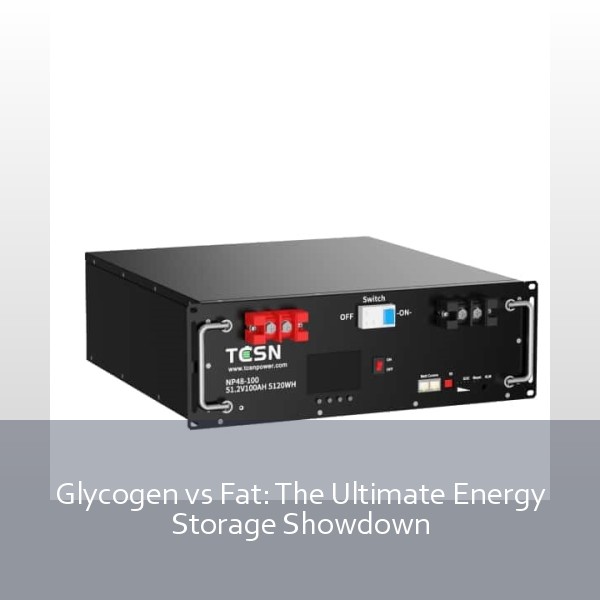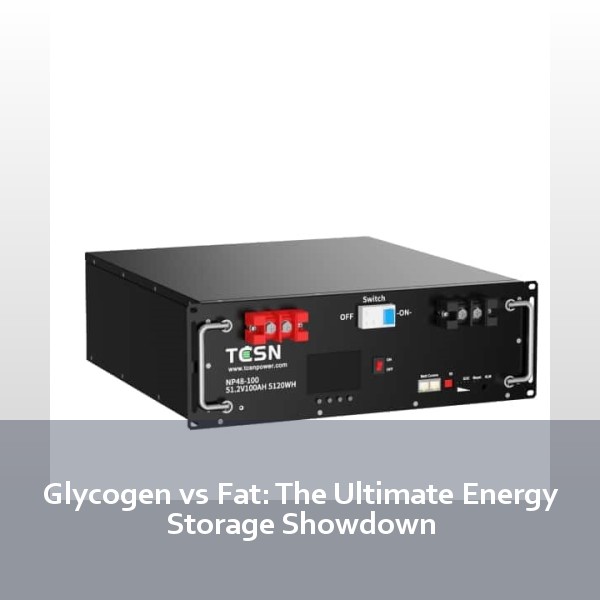Glycogen vs Fat: The Ultimate Energy Storage Showdown

Why Your Body Has Two Fuel Tanks (And When to Use Each)
Ever wonder why you crash during marathon training but breeze through a sprint? Meet your energy storage superheroes: glycogen and fat. These biological batteries power everything from your morning jog to your late-night Netflix binge. Let's crack the code on how your body manages these fuel sources - and why even elite athletes sometimes feel like they're running on empty.
The Speed Demon vs The Marathoner
Picture glycogen as your body's cryptocurrency wallet - quick to access but limited in capacity. Now imagine fat as a Swiss bank vault - massive storage but slower withdrawals. Here's how they stack up:
- Glycogen: 2,000 calories stored in muscles/liver (about 90 minutes of intense exercise)
- Fat: 40,000+ calories in adipose tissue (enough to walk 500+ miles)
Metabolic Mechanics: How Your Body Converts Fuel
Glycogen's All-Out Sprint
When you're crushing a HIIT workout, your muscles tap glycogen through anaerobic glycolysis. This lightning-fast process:
- Requires no oxygen
- Produces ATP 100x faster than fat burning
- Creates lactic acid (that "burn" you feel)
Pro tip: Ever noticed cyclists downing bananas mid-race? They're refueling glycogen stores to avoid "bonking" - the sudden energy crash when glycogen runs dry.
Fat's Slow Burn Marathon
During your Sunday hike or overnight fast, fat takes center stage through lipolysis. This oxygen-dependent process:
- Releases fatty acids into bloodstream
- Produces ketones during prolonged fasting
- Generates 3x more ATP per gram than glycogen
Fun fact: A 150-pound person carries enough fat energy to run 30+ marathons back-to-back. Not that we're recommending that!
The Crossover Point: When Your Body Switches Gears
Your energy mix changes like a DJ blending tracks. At rest: 70% fat/30% glycogen. During all-out effort: 95% glycogen. The magic happens at 60-75% max heart rate - where fat burning peaks. Here's the kicker: Improved metabolic flexibility lets athletes burn fat at higher intensities. Talk about a competitive edge!
Real-World Applications
- Weightlifters: Need explosive glycogen power for heavy lifts
- Ultra-runners: Train to optimize fat adaptation
- Office warriors: Balance both systems through intermittent fasting
Hacking Your Energy Systems
Nutrition coach Dr. Sarah Thompson shares: "My clients who master carb cycling see 23% better endurance gains." Try these evidence-backed strategies:
- Train low: Do fasted morning workouts to enhance fat adaptation
- Race high: Carb-load before endurance events
- Sleep smart: Your brain burns 400 calories of glycogen overnight
The Keto Conundrum
While ketogenic diets force fat adaptation, a 2023 Journal of Sports Medicine study found they reduce peak power output by 8%. The sweet spot? Periodized nutrition that times carbs with high-intensity training days.
Future of Fuel: Emerging Research
Scientists are exploring glycogen supercompensation techniques and brown fat activation. Meanwhile, wearable tech now estimates real-time fuel use through sweat biomarkers. Who needs a gas gauge when your smartwatch can tell you you're running on fumes?
Next time you fuel up, remember: your body's not a single-engine vehicle. It's a hybrid marvel that's been fine-tuned through millions of years of evolution. Whether you're sprinting for the bus or hiking the Appalachian Trail, understanding your energy storage systems means you'll never get caught empty-handed... or empty-fueled.
- Pre: Why Hydrogen Energy Storage Systems Are the Future of Clean Power
- Next: Shared Community Energy Storage Allocation and Optimization: Powering the Future Together
Related Contents

Glycogen vs Fat: The Ultimate Energy Storage Showdown
Ever wonder why you crash during marathon training but breeze through a sprint? Meet your energy storage superheroes: glycogen and fat. These biological batteries power everything from your morning jog to your late-night Netflix binge. Let's crack the code on how your body manages these fuel sources - and why even elite athletes sometimes feel like they're running on empty.

Renewable Energy With Storage vs Fossil Fuels: The Ultimate Energy Showdown
A heavyweight boxing match where renewable energy with storage enters the ring against the reigning champion fossil fuels. The crowd's roaring as solar panels gleam under stadium lights and oil rigs clank in the opposite corner. But here's the twist - this isn't just entertainment. The outcome directly impacts your electricity bill, your children's climate future, and whether polar bears get to keep their ice cubes.

Why Are Starch and Glycogen the Ultimate Energy Storage Superheroes?
You're a cell with excess energy. Do you store it as random sugar confetti or organize it into compact molecular libraries? Enter starch and glycogen – nature's answer to biological energy storage that makes Marie Kondo proud. But why did evolution favor these molecules over, say, a giant blob of fat? Let's break down their secret sauce.
